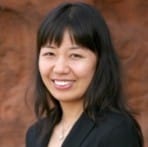
After graduating with a PhD in Analytical Chemistry from Stockholm University in 2015 and receiving an honorable mention for the Phabian Award from the Swedish Pharmaceutical Society for her PhD thesis, Dr. Liying Jiang is ready to start a career in anti-doping after becoming the PCC’s first female and first international fellow.
While Dr. Jiang was born in China and has spent the majority of her education in Sweden, her acceptance into the PCC program will see her moving to London to work under the distinguished Dr. David Cowan at King’s College London’s Drug Control Center this month.
Here’s what you won’t find on her resumé:
She’s no stranger to the lab
“My PhD research experience focused on mass spectrometry-based analytical method development and application. Luckily, I had the chance to work on both small molecules, such as amino acids, and big molecules, such as peptides and proteins, using different mass spectrometers. Since doping covers diverse compounds with a wide range of molecular weights, my previous lab experience was excellent preparation for research in this field.”
Mass Spectrometry led her to the PCC Fellowship Program
Dr. Jiang was first introduced to the world of anti-doping research in 2013 while listening to scientists from the Karolinska Institutet in Sweden discuss their research at a Thermo-Fischer Scientific Instrument user meeting. One year later, Dr. Magnus Ericsson, Director of Sweden’s Doping Control Laboratory piqued her interest once more: “Dr. Ericsson’s student presented research surrounding the validation of a screening method for doping tests using high resolution mass spectrometry. I got to know some details about doping analysis and became fascinated with the
She did her research
After discussing her interest in the field with Dr. Magnus Ericsson, Liying did her due diligence to find out more: “I sought publications in peer reviewed journals to learn more about anti-doping and found the PCC was acknowledged as a financial supporter in some good papers. After I graduated from my PhD in Analytical Chemistry in 2015, I applied for the PCC Fellowship.”
She has big aspirations
Dr. Jiang hopes to address some of the anti-doping movement’s contemporary challenges with her long and short term research priorities, which include reducing the cost of doping analysis and developing analytical methods to detect the latest drugs designed for competitive advantages in sport.
Dr. Jiang adds, “In particular, I will focus on the development of a unified platform using an electrospray and photoionization (ESPI) dual ion source to improve the ionization, and thus detection coverage of a wide range of compounds.”
Protecting healthy athletes is a core motivator
“Anti-doping research plays a vital role in ensuring clean competition in sports and protecting athletes from harmful drugs…[this] will keep me motivated,” says Jiang.
But she also loves a challenge
“[Anti-Doping researchers] work with numerous doping agents with wide physicochemical properties and dynamic ranges in biofluids, and new-emerging drugs bring both enormous challenge and opportunity for analytical chemists. The analytical tools developed for doping tests must be highly reliable and withstand potential challenges by third parties all while being cost-effective, practical, efficient and reproducible.”
She believes collaboration is key
When asked what aspect of the PCC Fellowship she is most excited for, Dr. Jiang doesn’t hesitate: “I most look forward to meeting and working with people and scientists in the anti-doping community, and growing my network with the PCC.” Not only that, but working alongside preeminent scientists is a big draw to the program for Liying: “This research field attracts excellent analysts who are scrupulous and use their acumen to advance science in a noble way. Those are the people I would like to work with.”
And understands the importance of teamwork for anti-doping science
“Analytical methods used in [the anti-doping] field have to be consistent and comparable among all current 34 WADA-accredited laboratories so that variations among testing results are minimized. This is the only way programs such as the Athlete Biological Passport can be successfully implemented. Researchers who work in this field must be comfortable working within a collaborative environment to ensure the greatest advances can be made. This is a healthy scientific ecosystem which I’m excited to contribute to.”
Finally, family and sports fill her free time
PCC Fellows don’t spend all of their time in the lab! While Dr. Jiang is excited to delve into her research, she recognizes that work-life balance is key: “During my spare time, I enjoy going outside with my young family and friends. I have lived in Sweden for almost ten years and the Swedes have great passion for sport. For instance, many Swedes jog all year around, despite inclement weather! Encouraged by these athletes, I took up jogging, swimming and yoga. I also became a football fan after my daughter started to play in the famous Swedish football club AIK.”
The PCC is excited to support Dr. Jiang’s exploration of a career in anti-doping science, and hope that her passion for sport and contributing to a global society of healthy athletes continue to motivate her quest for scientific development.